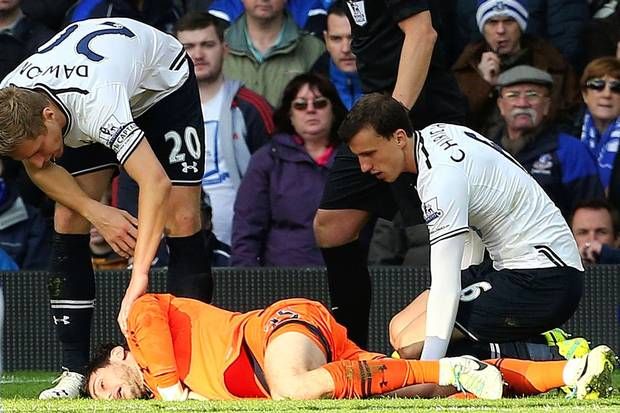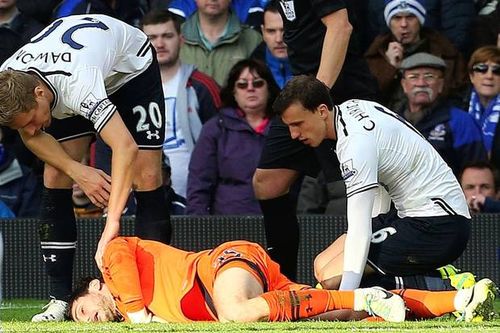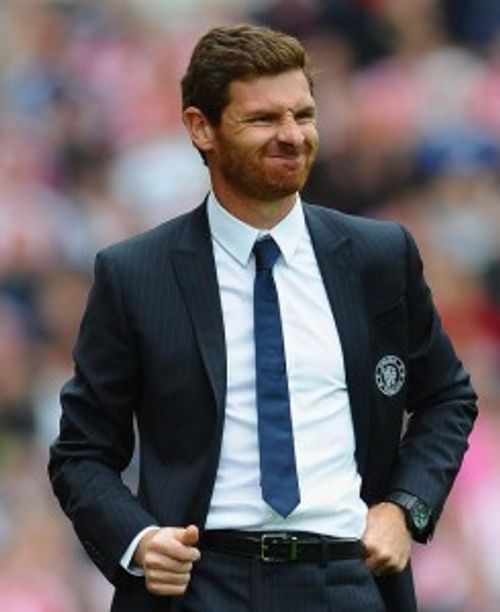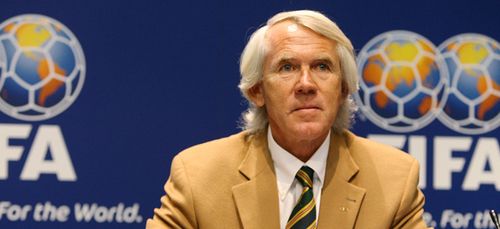
Villas Boas’ big concussion mistake and how it can be prevented in the future

Tottenham Hotspur goalkeeper Hugo Lloris lies unconscious after colliding with Everton’s Romelu Lukaku.
By now pretty much everyone following the football news cycle knows about the Hugo Lloris situation at Tottenham.
In Spurs’ 0-0 draw with Everton two weekends ago, the team decided to allow goalkeeper Hugo Lloris to continue playing after a collision with Romelu Lukaku had rendered him unconscious for a brief period. Lloris initially looked unable to continue and was set to go off on a stretcher, but after a lengthy delay the stretcher left the field empty and Lloris was allowed to play on.
Spurs manager Andre Villas-Boas was quick to defend the decision during his post-match media appearances. “It was a big knock, but he looked composed and ready to continue,” said the Tottenham boss. “Hugo seemed assertive and determined to continue and showed great character and personality. We decided to keep him on based on that. The call always belongs to me.”
Wayne Diesel, Tottenham’s head of medical services, also defended the team’s actions in returning Lloris to the field: “Once the relevant tests and assessments were carried out, we were totally satisfied that he was fit to continue playing.”
AVB shows himself up

Andre Villas Boas: “”Hugo seemed assertive and determined to continue and showed great character and personality. We decided to keep him on based on that. The call always belongs to me.”
Villas-Boas has not handled this situation very well. His comments and justifications for the club’s decision revolved around the fact that Lloris wanted to continue. He specifically mentioned that Lloris “seemed determined to continue and showed great character”, praising his goalkeeper’s determination to carry on playing and insinuating that it was a significant factor in allowing him to return to the game.
If that is true, it is a terrible piece of managing by Villas-Boas. A competitive sportsman always wants to continue playing. I have personal experience of it myself; I was knocked out cold in an American Football game and spent the rest of the game trying to convince my coach to let me go back in.
Players are not rational, and in the heat of competition they rarely think about their own safety first. Luke Griggs, the spokesman for brain-injury charity ‘Headway’, noted in his assessment of the incident that “Mr Villas-Boas’s comment that his player’s determination to play on was proof of his ‘great character and personality’ is simply wrong and dangerous.”
The decision could have been made primarily because of the medical assessments made by Tottenham’s medical staff, or it could have been influenced by the player’s own opinions. We will probably never know either way. Regardless, Villas-Boas conduct after the decision was made has been nothing short of ridiculous.
The most infuriating aspect of this entire situation was not the manager’s original decision to keep Lloris on the field, but his outrageous insistence throughout that he did the right thing. Villas Boas maintained that he made the correct decision, saying “I stand absolutely by the decision I took and I stand by the decision that the medical department took following the checks that they made on the player.”
The Spurs’ manager said this on 6th November. The very next day he left the goalkeeper out of his side for the team’s Europa League clash with Sheriff on the advice of his medical team. Three days later in their EPL clash with Newcastle United, Lloris was left out again.
Keeping Lloris out of the starting eleven would indicate to any reasonable man that Villas-Boas did indeed make the wrong decision by leaving his goalkeeper on the pitch at Goodison Park. Lloris clearly was not well in the week following his head injury; so much so that he wasn’t able to play in a game 7 days after the initial incident took place. As Gary Linekar pointed out, that is itself an admission of a mistake:
Lloris rested once more, an admission in itself that Spurs erred in leaving him on last week.
— Gary Lineker (@GaryLineker) November 10, 2013
So what Villas-Boas is effectively saying by a combination of his defensive words and his revealing team selections is “we made a mistake in letting Lloris play for the rest of the Everton game because he has not been fit enough to play in the two games following his head injury. However, I absolutely stand by the decision I made and I stand by my medical department’s assessment of Lloris even though it was obviously wrong and potentially dangerous to let him continue playing.”
What makes Villas-Boas look even more foolish is that he is defending his decision in the wake of a battering of criticism from much more qualified sources. He is, in essence, defending a medical decision against doctors.
World players’ union FIFPro, the Professional Footballers’ Association and numerous brain charities were among those critical of Villas-Boas. FIFPro medical advisor Vincent Gouttebarge said that “the decision is unacceptable”. FIFA’s chief medical officer, Professor Jiri Dvorak, felt Lloris should have been substituted in accordance with the governing body’s guidelines. He said that “It’s a 99% probability that losing consciousness in such an event will result in concussion. We have a slogan: if there is any doubt, keep the player out.”

Professor Jiri Dvorak, FIFA’s chief medical officer: “if there is any doubt, keep the player out.”
Luke Griggs of ‘Headway’ also felt Spurs made the wrong call:
“When a player suffers a blow to the head that is severe enough for them to lose consciousness, it is vital they urgently seek appropriate medical attention. A physio or doctor treating a player on the pitch simply cannot accurately gauge the severity of the damage caused to the player’s brain in such a setting as there may be delayed presentation of symptoms. By continuing to play, the player may have caused greater damage to his brain. He should have been removed from the game immediately and taken to hospital for thorough tests and observation.”
Why would you defend your mistakes when it is so obvious to everyone that you got it completely and utterly wrong? By sticking to his guns, Villas-Boas has come out of this entire saga looking like the kid in the playground with chocolate around his mouth, vigorously denying that he stole your Mars bar. It’s not a good look for a man who is supposed to be in charge of an entire football team.
The important aspect of this story, however, is not Villas-Boas’ supposed incompetence. It is that the footballing world hears the voices of the experts concerned, and doesn’t let this happen again. The football authorities can learn from this entire incident and use that knowledge to become more adept at preventing future head trauma controversies.